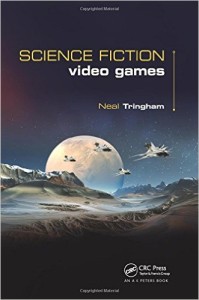I’d like to tell you quickly today about two books that have recently crossed my desk, both of which do gaming history the way it ought to be done.
The first is David L. Craddock’s Dungeon Hacks: How NetHack, Angband, and Other Roguelikes Changed the Course of Video Games. It’s a collection of “making of” articles not all that different from many that I write here, except that they deal with a genre that I sadly don’t know all that much about. Perhaps the best compliment I can give the book is that, despite very limited personal experience with the games Craddock writes about that’s confined largely to a bit of dabbling here and there in NetHack, I found it interesting enough to stay up late to read it. Craddock is that good a storyteller, one who knows how to keep the anecdotes under control in order to keep the narrative flowing. I’m not entirely sure that he really makes the argument promised in his subtitle; this is a nuts-and-bolts book that focuses on personalities and the processes of making the games in question, and doesn’t spend the time on their greater impact that a phrase like “changed the course of video games” would imply. Especially if you’re a fan of the genre, however, I’m sure you’ll find it a very worthwhile read. I also recommend Craddock’s earlier history of Blizzard Entertainment, Stay Awhile and Listen, which has already proved a valuable source for one or two of my own articles.
The other book is of a much broader scope. Neal Tringham’s aptly titled Science Fiction Video Games is an attempt to catalog and set in context all significant science-fiction videogames ever. Apart from some interesting if brief chapter introductions, the bulk of the book consists of capsule summaries of games grouped by genres: “Adventures,” “Computer Role-Playing Games,” etc. One might well argue that we have MobyGames already for that sort of thing, but Tringham’s project is redeemed by the even-handed nature of his summaries, summaries that cover not only the broad details of plot and mechanics but also the critical consensus on the games’ merits. Each is a model of thoughtful concision that… well, let’s just say that many MobyGames reviewers could learn a thing or two from Tringham. I’m already finding it to be a valuable volume for my reference shelf. I just wish it covered all games instead of only those that are at least vaguely science fictional. I would change just two other things: a) organize the summaries chronologically rather than alphabetically to give a better sense of how each genre developed (there’s already an excellent index for looking up titles); and b) make it a hell of a lot cheaper.
Both of these books are professionally edited, carefully written, and well laid-out. I didn’t want to throw either of them against the wall ten minutes after starting to read. That may sound like damning with faint praise, but there are actually very few other books from self-publishers and small presses about which I can say the same thing. I hope we’ll soon see many more of similar quality, from these authors and the many others for whom they’ll hopefully serve as an example. Videogames are fun, but they’re also worth taking seriously.
(Full disclosure: I was gifted free copies of both books by their authors. I also gave Craddock some editorial feedback when his book was undergoing its final round of polishing.)












Felix
August 17, 2015 at 5:47 pm
Woo, roguelikes! For a genre I’m not especially fond of, I spent a LOT of time both playing and making them. And it’s incredibly complicated, even for a text-based game. Would recommend the experience to any aspiring RPG developer.
TsuDhoNimh
August 17, 2015 at 8:53 pm
Thanks for the recommendations! Other than the wonderful material on this site, I haven’t read a good work on games in a few years.
One correction: you call Craddock’s Blizzard book “Stay Awake and Listen” but it’s actually “Stay Awhile and Listen”. I think those words are burned into my brain from too much Diablo 2 many years ago.
Jimmy Maher
August 18, 2015 at 5:42 am
Thanks! When I hear “stay awhile,” I just think of Impossible Mission, which just goes to show that I belong to an entirely different generation I guess. :)
TsuDhoNimh
August 21, 2015 at 1:49 pm
Haha! I remember that one, too. Sadly, the evil genius was right in my case; I never was able to finish Impossible Mission.
Keith Palmer
August 18, 2015 at 12:22 am
An article aggregated on Planet-IF got me playing a few roguelikes (Nethack not among them, I’ll admit) in just the past few days, so this did catch my attention. I also remember Epyx commercialized Rogue in the 1980s and I actually got to play it then, although I did figure out that by putting a write-protect sticker on the floppy right after saving the game, I could cheat to the extent of not losing all my progress with each death…
Steve
June 3, 2017 at 12:40 am
A quick comment on your use here of the phrase “_____ is just that…”:
“Neal Tringham’s aptly titled Science Fiction Video Games is just that…”
It’s just what? Several science fiction video games? ;)
The full sentence would make sense if the book was called something like “Catalog of Sci-Fi Video Games,” but, strictly from a copy editing perspective, the phrase doesn’t quite fit here.
The easiest solution would be to simply remove the “just that,”; you’ll find the sentence not only makes more sense, it also [as is true with most sentences in which it’s used] loses absolutely nothing from the excision.
Jimmy Maher
August 28, 2023 at 9:12 am
A belated thanks!
Michael
August 21, 2023 at 9:46 pm
“this is a nuts-and-bolts books” => “a…book,” I would think.
Jimmy Maher
August 28, 2023 at 9:12 am
Thanks!
Adam Huemer
June 28, 2025 at 10:11 am
I wasn’t familiar with online Hack/Rogue clones as a kid, only read about it, but still very much like “The Sword of Fargoal” by Epyx for VIC-20 and C64. It’s simple but very addicitve (“just one more try”).
https://pirates.emucamp.com/a/t/swordfargoal/c64/main.html